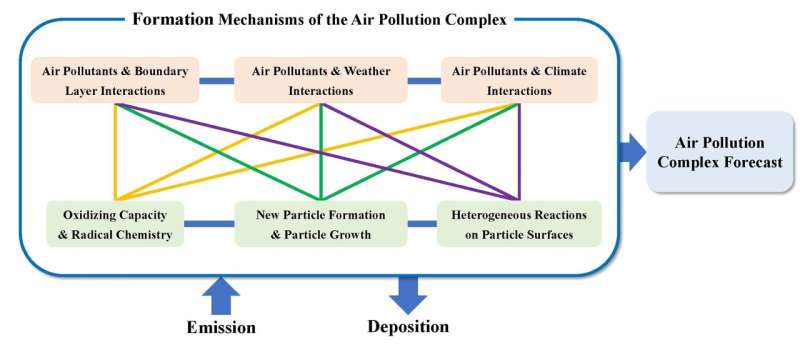Study offers improved air pollution understanding in China

Air pollution in China is generated from many sources and interacts chemically and physically within the atmosphere in ways that can be difficult to predict. The concept of the Air Pollution Complex was created to address the underlying complexity of air pollution, and scientists have just recently developed a framework to apply the most current research to air pollution prediction and mitigation strategies.
Here, a group of leading scientists have outlined the most significant progress that has been made in the last two to three years in air pollution research in China.
China has two main sources of air pollution: coal combustion and vehicle exhaust. These two components of air pollution, coal smoke and photochemical smog, interact both chemically and physically in complex ways in the atmosphere, creating the Air Pollution Complex. Researchers in China have spent decades researching the formation mechanisms of the Air Pollution Complex by investigating sources, sinks, transport and transformation processes, and effects of air pollution.
These studies have been integrated into a theoretical framework for the Air Pollution Complex to help scientists better understand, predict and mitigate air pollution in China. A group of the most prominent scientists in the fields of air pollution and atmospheric chemistry in China summarized the most significant progress that has been made in these fields within the past two to three years.
The team published their review in the journal Advances in Atmospheric Science. It’s one of nine review papers of a special issue on the National Report to the 28th International Union of Geodesy and Geophysics General Assembly to be held on July 11-20, 2023, by the Chinese National Committee of International Association of Meteorology and Atmospheric Sciences.
“Air pollution, especially the air pollution in China we are facing today, is from multiple emission sources and results from complicated chemical and physical processes in the atmosphere. The Air Pollution Complex has been proposed to comprehensively and holistically understand the complicated nature of air pollution,” said Tong Zhu, first author of the review paper and professor in the College of Environmental Sciences and Engineering at Peking University in Beijing, China.
“This review summarizes the most recent advances of air pollution research in China and how … they contribute to the … theoretical framework of the Air Pollution Complex,” said Zhu.
Creating the framework for the Air Pollution Complex helps atmospheric chemists and air pollution scientists predict air quality hazards and shape environmental policies aimed at controlling and mitigating air pollution in China.
“These tremendous advances in air pollution research have helped establish the theoretical framework of the Air Pollution Complex and describe its complicated and nonlinear feedback nature. The theoretical framework of Air Pollution Complex is essential to better simulating atmospheric physical and chemical processes which lead to the formation of the Air Pollution Complex, to forecast air pollution with much lower uncertainties and to support air pollution control measures and policies with robust science,” said Zhu.
The review team outlined the most compelling advances in air pollution and atmospheric chemistry research in China, including air pollution sources and emissions; atmospheric chemistry; effects on the climate, meteorology and the weather; effects on the biosphere, or regions of the earth occupied by living organisms; and mathematical models based on experimental observations.
“The advances of atmospheric chemistry research on the mechanism of air pollution formation … in China have provided robust scientific support to the very successful air pollution control policies implemented in China,” said Zhu. These successful control measures may additionally benefit low-income and developing countries that likely face similar air pollution challenges.
Zhu and his team understand that a cooperative effort is required to make the most significant impact on worldwide air pollution. “It is a great challenge in China and across the globe to coordinate carbon emission reduction and air quality improvement to achieve the most benefits for human health. Atmospheric chemistry research in China should be able to and must make important contributions,” said Zhu.
Future research efforts will focus on the mechanism of the Air Pollution Complex formation to control PM2.5, or particulate matter 2.5 micrometers or less in diameter that negatively impacts human health, and ozone (O3), also known as the main pollutant of photochemical smog.
More information:
Tong Zhu et al, Recent Progress in Atmospheric Chemistry Research in China: Establishing a Theoretical Framework for the “Air Pollution Complex”, Advances in Atmospheric Sciences (2023). DOI: 10.1007/s00376-023-2379-0
Conference: www.iugg2023berlin.org/home-2/
Citation:
Study offers improved air pollution understanding in China (2023, June 15)
retrieved 16 June 2023
from https://phys.org/news/2023-06-air-pollution-china.html
This document is subject to copyright. Apart from any fair dealing for the purpose of private study or research, no
part may be reproduced without the written permission. The content is provided for information purposes only.
For all the latest Science News Click Here
For the latest news and updates, follow us on Google News.

